The ocean, vast and mysterious, has long captivated human imagination. Its depths, rhythms, and moods have inspired countless metaphors, enriching our language and understanding of this aquatic realm. This exploration delves into 37 metaphors for the ocean, offering a linguistic journey through the seas. The ocean, vast and mysterious, has long inspired human imagination. Its depths, rhythms, and moods have given rise to countless metaphors.
From “Earth’s blanket” to a “living museum,” these metaphors capture the ocean’s multifaceted nature and its crucial role in our planet’s systems. This journey through the seas explores 37 metaphors for the ocean, reflecting its importance in regulating climate, supporting life, and shaping human history. As we face environmental challenges, these metaphors remind us of the sea’s vital importance and our deep connection to it.
1. The Ocean as a Blanket

The ocean often serves as Earth’s comforting cover, wrapping around continents like a cozy blanket. Indeed, this metaphor highlights the ocean’s role in regulating global temperatures. Furthermore, it emphasizes the sea’s ability to provide a sense of security to coastal dwellers. In essence, the ocean acts as a protective layer, not only influencing climate but also offering psychological comfort to those living near its shores.
Example: In a travel brochure for a seaside resort, Sarah writes: “Nestled along the coast, our resort offers rooms where you can feel the ocean’s gentle blanket enveloping you in tranquility.”
2. The Sea as a highway
Long before planes and cars, the ocean was humanity’s primary transportation network. This metaphor emphasizes the ocean’s role in connecting distant lands and cultures.
Example: In a history lesson, Professor Johnson explains: “For centuries, the Atlantic Ocean served as a bustling highway, facilitating trade and cultural exchange between Europe and the Americas.”
Read More about this blog:35 Metaphors for Summer: The Vivid Canvas of the Warm Season
3. The Ocean as Earth’s Lungs
Much like forests, oceans play a crucial role in our planet’s respiratory system, producing oxygen and absorbing carbon dioxide. This metaphor underscores the ocean’s vital importance to life on Earth.
Example: In an environmental report, Dr. Martinez states: “Protecting our oceans is equivalent to safeguarding Earth’s lungs. Their health directly impacts the air we breathe.”
4. The Sea as a Time Capsule
The ocean floor preserves countless historical artifacts and natural records, making it a vast underwater archive of Earth’s history.
Example: Marine archaeologist Emma writes in her journal: “Each dive feels like opening a time capsule. Today, we uncovered pottery from an ancient civilization, perfectly preserved in the ocean’s care.”
5. The Ocean as a Mirror
Reflecting the sky above, the ocean often acts as a giant mirror, changing its appearance with the weather and time of day.
Example: In a postcard to his friend, Tom describes: “The sunset here is breathtaking. The ocean becomes a perfect mirror, doubling the spectacle of colors in the sky.”
6. The Sea as a Cradle
Scientists believe life on Earth originated in the oceans, making them the cradle of life itself.
Example: In a biology textbook introduction, the author notes: “Our story begins in the primordial seas, the cradle where the first sparks of life were nurtured into the diverse biosphere we know today.”
7. The Ocean as a Playground
For many, the ocean is a vast recreational space, offering endless opportunities for fun and adventure.
Example: In a summer camp brochure, the description reads: “Our beachfront location turns the Atlantic into your playground, with activities from surfing to snorkeling.”
8. The Sea as a Battlefield
Throughout history, oceans have been the stage for numerous naval conflicts, earning them the metaphor of a watery battlefield.
Example: In a military history podcast, the host begins: “The Pacific Ocean transformed into a vast, unforgiving battlefield during World War II, witnessing some of the most decisive naval engagements in history.”
9. The Ocean as a Grocery Store

For coastal communities and marine life, the ocean serves as a bountiful supermarket, providing a diverse array of food sources.
Example: In a cooking show, Chef Maria explains: “For the coastal people of Peru, the Pacific Ocean is their local grocery store, offering an incredible variety of fresh seafood daily.”
10. The Sea as a Monster
In folklore and literature, the ocean often takes on the persona of a temperamental beast, capable of both nurturing and destroying.
Example: In a fisherman’s tale, old Jack recounts: “The sea was a slumbering monster that day. We knew better than to wake it with our little boat.”
11. The Ocean as a Canvas
The ever-changing surface of the ocean serves as nature’s dynamic canvas, painted by wind, light, and marine life.
Example: In an artist’s statement, Lydia writes: “I draw inspiration from the Caribbean Sea, nature’s most captivating canvas, where each wave and ripple tells a unique story.”
12. The Sea as a Bridge
Oceans connect continents and cultures, acting as a liquid bridge between distant shores.
Example: In a diplomatic speech, Ambassador Chen states: “The Pacific Ocean is not a barrier, but a bridge connecting our nations, fostering understanding and cooperation.”
13. The Ocean as a Sponge
The ocean absorbs vast amounts of heat and carbon dioxide, acting like a giant environmental sponge.
Example: In a climate change report, Dr. Nakamura explains: “Our oceans have been acting as a massive sponge, absorbing excess heat from the atmosphere and mitigating the immediate effects of global warming.”
14. The Sea as a Time Machine
The ocean’s currents and layers preserve information about Earth’s past climates, making it a natural time machine for scientists.
Example: In a research proposal, oceanographer Dr. Brown writes: “By studying deep-sea sediments, we can use the ocean as a time machine, traveling back thousands of years to understand past climate patterns.”
15. The Ocean as a Melting Pot
The mixing of water from different sources makes the ocean a great mixer of nutrients, temperatures, and marine life.
Example: In a marine biology lecture, Professor Taylor explains: “The Gulf Stream acts like a giant melting pot, blending warm Caribbean waters with the cool Atlantic, creating a unique ecosystem.”
16. The Sea as a Highway of Life

Ocean currents serve as transportation routes for many marine species, from plankton to whales.
Example: In a nature documentary script, the narrator says: “The East Australian Current serves as a bustling highway for marine life, carrying sea turtles and fish on journeys spanning thousands of miles.”
17. The Ocean as a Pressure Cooker
The extreme conditions in the deep ocean create an environment akin to a natural pressure cooker, shaping unique life forms.
Example: In a research paper, marine biologist Dr. Suzuki writes: “The hydrothermal vents at the ocean floor act as nature’s pressure cookers, fostering extremophile life forms adapted to incredible heat and pressure.”
18. The Sea as a Graveyard
The ocean floor is the final resting place for countless ships, marine creatures, and even continents, earning it the metaphor of an underwater graveyard.
Example: In a shipwreck exploration log, diver Alex notes: “Descending into the Caribbean depths feels like entering a vast underwater graveyard, where centuries-old shipwrecks tell tales of maritime history.”
19. The Ocean as a Thermostat
The ocean plays a crucial role in regulating Earth’s climate, acting as a global temperature control system.
Example: In a climate science textbook, the author explains: “The Pacific Ocean functions as Earth’s thermostat, absorbing and distributing heat to maintain a habitable planet-wide temperature.”
20. The Sea as a Treasure Chest
From precious pearls to sunken gold, the ocean holds countless hidden riches, much like a mysterious treasure chest.
Example: In a treasure-hunting reality show, the host exclaims: “The Mediterranean Sea is a vast treasure chest, hiding millennia of human history beneath its waves.”
21. The Ocean as a Living Organism
Some view the entire ocean as a single, interconnected living entity, responding and adapting to changes like a giant organism.
Example: In an eco-philosophy book, the author muses: “If we consider the Atlantic Ocean as a living organism, we begin to understand the intricate connections between its currents, marine life, and global climate.”
22. The Sea as a Playground for Giants
The vastness of the ocean provides space for Earth’s largest creatures, making it a playground for giants like whales and giant squid.
Example: In a whale-watching tour brochure, the description reads: “Join us for a voyage into the Pacific, nature’s playground for giants, where blue whales frolic in their watery domain.”
23. The Ocean as a Mood Ring
The ocean’s appearance changes with weather and light, reflecting different moods like a giant, natural mood ring.
Example: In a coastal weather report, meteorologist Jane says: “Today, the North Sea is acting like a moody teenager. Its dark, choppy surface reflects the stormy skies above.”
24. The Sea as a Universal Solvent

The ocean’s ability to dissolve more substances than any other liquid earns it the title of nature’s universal solvent.
Example: In a chemistry lecture, Professor Gómez explains: “The ocean is Earth’s universal solvent, capable of dissolving gases like carbon dioxide and various minerals, shaping its chemical composition.”
25. The Ocean as a Global Conveyor Belt
The system of ocean currents acts like a massive conveyor belt, moving heat, nutrients, and marine life around the planet.
Example: In an oceanography podcast, the host describes: “The thermohaline circulation is like a global conveyor belt, with the Gulf Stream delivering warmth to Europe’s shores.”
26. The Sea as a Cosmic Mirror
The vastness and mystery of the ocean often draw comparisons to the cosmos, making it Earth’s cosmic mirror.
Example: In an astronomy blog post, writer Zoe muses: “Gazing into the Pacific at night, with bioluminescent plankton mirroring the stars above, it’s easy to see the ocean as our planet’s cosmic mirror.”
27. The Ocean as a Liquid Desert
Despite its abundance of water, large parts of the ocean are nutrient-poor and sparsely populated, akin to a vast underwater desert.
Example: In a marine conservation report, biologist Dr. Nkosi writes: “The central gyres of our oceans are like liquid deserts, their nutrient-poor waters supporting little life compared to coastal regions.”
28. The Sea as a Memory Foam
The ocean retains imprints of past events, from temperature changes to oil spills, much like a giant memory foam mattress.
Example: In an environmental impact study, researcher Lisa notes: “The Caribbean Sea acts like a memory foam, retaining traces of past hurricanes in its temperature and salinity patterns.”
Read More about this blog:31 Metaphors for Sadness: Exploring the Emotional Landscape
29. The Ocean as a Pressure Valve
Oceans help regulate Earth’s internal pressure through underwater volcanoes and vents, serving as a planetary pressure release system.
Example: In a geology documentary script, the narrator explains: “The Pacific Ring of Fire serves as Earth’s pressure valve, with underwater volcanoes releasing the planet’s internal heat and pressure.”
30. The Sea as a Mixing Bowl
Ocean upwelling and currents mix nutrients and gases, making the sea a giant mixing bowl for marine life.
Example: In a marine ecology paper, Dr. Johnson writes: “The Humboldt Current system off South America acts as a massive mixing bowl, bringing nutrient-rich deep waters to the surface and supporting one of the world’s most productive marine ecosystems.”
31. The Ocean as a Safety Net

For many species, the ocean provides refuge and sustenance, acting as nature’s safety net.
Example: In a wildlife conservation brochure, the text reads: “For endangered sea turtles, the Indian Ocean serves as a crucial safety net, providing feeding grounds and nesting beaches essential for their survival.”
32. The Sea as a Natural Laboratory
Scientists often view the ocean as a vast experimental space, where nature conducts ongoing experiments in evolution and adaptation.
Example: In a research grant proposal, marine biologist Dr. Chen states: “The Galápagos marine reserve is nature’s laboratory, showcasing ongoing experiments in adaptation and speciation.”
33. The Ocean as a Global Air Conditioner
The ocean’s role in absorbing and distributing heat makes it Earth’s natural air conditioning system.
Example: In a climate science podcast, the host explains: “The Southern Ocean acts as Earth’s air conditioner, absorbing vast amounts of heat and carbon dioxide, helping to regulate our planet’s climate.”
34. The Sea as a Liquid Library
The ocean preserves records of Earth’s past in its sediments and ice cores, making it a vast underwater archive.
Example: In an oceanography textbook, the author writes: “The Arctic Ocean floor is like a liquid library, its sediment layers telling stories of Earth’s climate history spanning millions of years.”
35. The Ocean as a Planetary Juice Extractor
The ocean’s role in the water cycle is to be a giant juice extractor, pulling water from the land and atmosphere.
Example: In a hydrology lecture, Professor Yamamoto says: “Think of the Pacific as Earth’s juice extractor, drawing moisture from the atmosphere and returning it as life-giving rain to continents.”
36. The Sea as a Chemical Factory

The ocean is home to countless chemical reactions, acting as a massive natural chemical plant.
Example: In a marine chemistry paper, Dr. Rodríguez notes: “The Mediterranean Sea functions as a giant chemical factory, its sunlit surface waters driving complex reactions that produce dimethyl sulfide, influencing cloud formation and climate.”
37. The Ocean as a Living Museum
The sea preserves countless species and ecosystems, some unchanged for millions of years, making it a living natural history museum.
Example: In a deep-sea exploration documentary, the narrator describes: “Descending into the Mariana Trench is like entering a living museum, where creatures reminiscent of Earth’s ancient past still thrive in the crushing depths.”
conclusion
These 37 metaphors for the ocean offer a rich tapestry of language to describe the ocean’s many facets. From its role as Earth’s blanket to its function as a living museum, the ocean continues to inspire and shape our understanding of the world. As we face challenges like climate change and ocean pollution. these metaphors remind us of the sea’s vital importance to life on Earth.
They encourage us to view the ocean not just as a resource, but as an integral part of our planet’s systems. By fostering a deeper connection to the seas through language. we can hopefully inspire greater efforts to protect and preserve these magnificent bodies of water for future generations.

James Smith is an experienced blogger at PhrasePick, where he shares his expertise in English grammar and figurative language. With a passion for simplifying complex topics, James creates engaging content that helps readers master the nuances of the English language.





